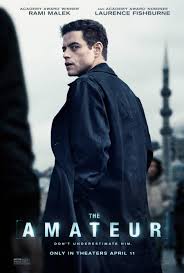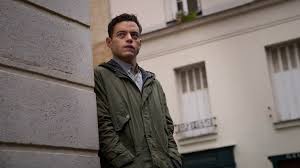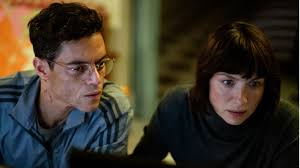
The Amateur wanted so badly to be a Jason Bourne movie. Unfortunately, it missed the mark. It was an entertaining movie with nice performances from Rami Malek as Charlie Heller, a CIA decoder whose wife is killed in a terrorist attack, and Laurence Fishburne as the CIA trainer, Henderson, who must get Heller ready for the field if he is to get revenge on those who killed his wife. Rachel Brosnahan also gives a nice performance as Heller’s wife, Sarah, who is tragically killed in a terrorist attack gone wrong. Holt McCallany is solid as Director Moore, a rogue CIA director directing illegal black ops who wants Heller out of the picture. Finally, Julianne Nicholson balanced Moore as the Director of the CIA, whose idealistic idea of cleaning up the CIA is threatened by Moore’s rogue actions.

That should have created a deep story with a compelling narrative and a dramatic plot. Unfortunately, director James Hawes gave us a film that was wide but shallow. It never allowed us to properly engage emotionally with what was happening in the story. Screenwriters Ken Nolan and Gary Spinelli also seemed to struggle with the source material provided by Robert Littell’s novel. It’s unfortunate that the screenplay and the film didn’t turn out better because the screenplay had the ingredients for a solid dramatic structure.
Adapting novels into screenplays is challenging.
This is an adaptation of a novel, and novels can be challenging to adapt to screenplay format. Getting everything from a novel into a two-hour movie is impossible, so important story points almost always must be omitted. While watching The Amateur, I could tell early on that key story elements were being glossed over or left out entirely. Screenwriters often have a choice when adapting a novel into a screenplay. They can attempt to get as much information into the script as possible without diving too deeply into it. Or they can turn the screenplay’s focus onto a few key elements of the story from the novel and explore them more deeply. Hawes, Nolan, and Spinelli chose the former. They gave us a screenplay that was wide but shallow. They wanted to give the audience as much from the novel as possible, so they did that without deeply exploring any one component.

That gave us a fun film, but not an emotional one. That wouldn’t matter if they didn’t give us scenes that were clearly intended to elicit emotional responses, only to fall flat because not enough work was done to get us emotionally involved. We can’t get emotionally involved when the story and characters are flat. There’s not enough for us to latch our emotions onto. Again, that’s fine if this film wanted to be Commando. It was clear, however, that it was striving for more than that.
This is a good but not great film.
This is an entertaining film. It’s a popcorn movie that will give you your money’s worth if you see a matinee screening of it. The action sequences and some of the VFX make it worth seeing on the big screen rather than waiting for it to make it to your favorite streaming service. However, for whatever reason, Hawes couldn’t give us the drama we needed for the film to go from good to great. That is where the lack of structure in the screenplay comes in. As I often tell screenwriters for whom I provide screenplay coverage, story structure isn’t an arbitrary idea that producers and studio executives need to understand screenwriting. Dramatic story structure is integral to building drama in a story. It marks the protagonist’s progress towards accomplishing his goal.

Heller has a clear goal in The Amateur. He wants to get revenge on the men who killed his wife. The inciting incident, or the Call to Adventure, happens when his wife is murdered during a terrorist attack in London. He works for the CIA, and he wants them to bring the perpetrators to justice. He does what he’s good at and breaks the codes that allow him to discover who they are. His call is Refused by Dir. Moore, who gives him a line about this being a part of a bigger conspiracy. From there, Heller provided evidence that Moore is engaging in illegal black ops and blackmails him into allowing him to train as a CIA agent. At that point, Heller Crosses the First Threshold from Act I to Act II when he begins training. The issue is that this doesn’t happen until we’re 40 minutes into the film. That takes too long, leading the first act to drag. That delays the drama that should be building in the second act, which makes it more difficult to engage the audience.
The second act begins with the archetypal Tests, Allies, and Enemies stage of The Hero’s Journey, with Henderson training Heller. This part of the story should have been dramatic, showing the challenges Heller faces in being a field agent. Hawes gave us this to a degree, but it is glossed over so quickly in the film that it might as well not have happened. We then learn that Moore and his team feel they cracked the code to prevent Heller’s evidence from going public and order Henderson to kill him. However, when Henderson gets to Heller’s room, he discovers he’s gone with multiple passports and plenty of cash to travel the world. Henderson then tells Moore that Heller took advantage of all the training he gave him. However, that line even falls flat because we didn’t see any of that training happen.
This film needed a tight 4-act structure.
Most people will tell you that screenplays are written in a 3-act structure. As I have pointed out, the best screenplays are written in 4 Acts. The Amateur would have been a more compelling story with a 4-act structure. The first two acts could have been written as I showed above; however, with the first act ending by page 30, and more time focused on Heller’s training. This would have allowed Heller’s relationship with Henderson to develop more, and that development was needed. We needed that relationship to be more than it was in the film. Henderson is Heller’s archetypal mentor, and this script would have been a lot more emotionally engaging, and things in the final act would have made a lot more sense and been a lot more plausible if Henderson was more of an archetypal ally to Heller as well. `

The third act, or Act IIB if you prefer, should have shown Heller killing the villain’s henchmen. Act IIB does end with an all-is-lost moment, as Heller loses his longtime ally, Inquiline (Caitriona Balfe), who has been helping him find the killers, is killed. Again, because Hawes didn’t do the heavy lifting of showing that Heller couldn’t do what he needed to do without help, this moment falls flat. The final act is about him finding the person who pulled the trigger, the group’s leader, and coming up with a creative way of bringing him to justice. Without giving too much away, this is another key moment where the terrorists are connected with Moore, but it’s nothing more than a coincidence that they were responsible for killing his wife. This script would have been much more effective if it had shown that Moore was pulling the strings the whole time. That would have provided the depth to the story that we would have needed, but the director and screenwriters opted for wide and shallow rather than a narrower but deeper approach.

The other thing the script lacks is stakes. Heller’s wife is already dead. He has nothing else to lose if he fails, other than his life. That should be enough, but it isn’t because we don’t care about him. Another thing I tell aspiring screenwriters is to give us the stakes and raise those stakes whenever you can. Heller needed more than just revenge. He needed some personal growth or to save something or someone else. The filmmakers attempted to show him growing as a person and getting over some internal fear, but it’s never clear what that fear is.
It’s a popcorn movie that could have been so much more.
Again, this is an entertaining movie. If you’re just looking for something to kill a couple of hours while you gobble down popcorn and soda, this movie is for you. What I find frustrating about it is that I can see that it could have been better, and I have opinions on how it could have been better. Unfortunately, the filmmakers had other motivations. They made the movie they wanted to make, but it didn’t accomplish what they wanted it to achieve.